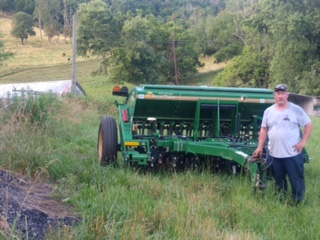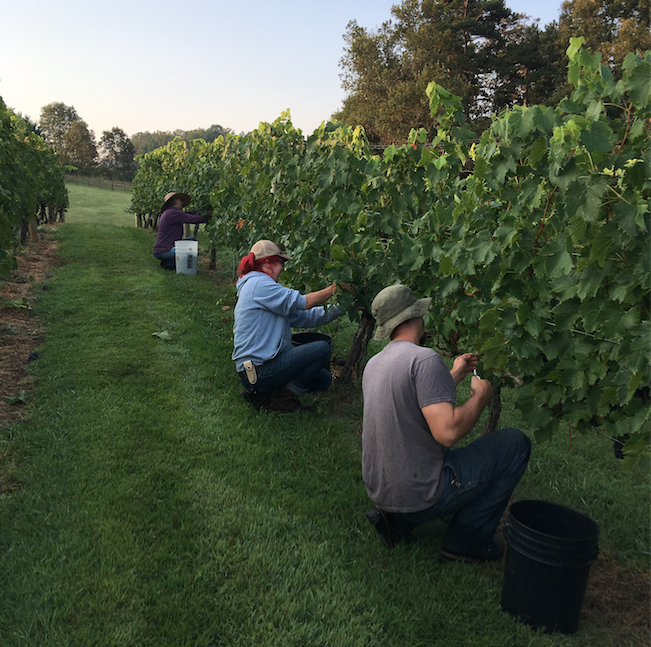“Insanity!” blurts Jeff Frisbee with a laugh, his succinct response when asked what inspired him to plant a vineyard on a portion of the 55 acres of land in Leicester that has been in the family since his grandfather, Addison Farmer, purchased it in 1937 and farmed tobacco for decades. “I didn’t know anything about growing grapes,” he admits. “I had done some home wine-making, and everything I made turned out pretty good, so I thought ‘Shoot, anyone can do this!’ I was sorely mistaken. My dad says grapes are more work than tobacco ever thought of being.”
It was, in fact, the decline of the tobacco farming industry and a desire to keep working the family land that led Frisbee and his wife, Dianne, to leave Atlanta, return to Leicester and, in 2009, with his parents, Maleada and Eddie Frisbee, plant the first acre of a vineyard, named Addison Farms Vineyard to honor his grandfather.
As tough as it was, it would have been decidedly more difficult, if not impossible, without the three WNC AgOption grants he has been awarded, the first in 2011 and most recent (and the final one he’s eligible for) in 2019. This year’s grant will help build a covered crush space the family will also use for bottling the wine produced from the grapes. “We could not make a living just growing grapes,” says Frisbee. “We had to do the winery to have a shot at making it work.”
Seed money
Addison Farms Vineyard was one of four Leicester farms that each received a grant of $6,000 in 2019 to boost farm diversification projects and offset the risk of trying and expanding new ventures. In all, WNC Agricultural Options awarded 39 farm businesses a total of $216,000 in $3,000 and $6,000 allotments.
AgOptions began in 2004 when the N.C. Cooperative Extension applied for a grant from the N.C. Tobacco Trust Fund Commission, created in 2000 by the N.C. General Assembly to help current and former tobacco farmers, tobacco-related businesses and others affiliated with the industry. The application was made through WNC Communities, the nonprofit founded to support agriculture in the region; WNC Communities has served as the administrator of the program since 2012.

“The AgOptions program was started to meet the needs of farmers who were transitioning out of growing tobacco and to help farming communities whose economic engine had been tobacco,” explains Jennifer Ferre, who serves as executive director of WNC Communities and program coordinator for AgOptions. “Since 2004, we have given more than $2.8 million to farmers in Western North Carolina, funded exclusively by the N.C. Tobacco Trust Fund. It is intended to help farmers diversify and expand, keep farmers farming and help farmland remain farmland.”
Third-generation farmer Shannon Morgan of S.D. Morgan Farms raises cattle on land originally operated as Morgan Branch Dairy Farms. “It was a dairy farm until 1996, and then we got out of that because of EPA regulations regarding wastewater runoff,” Morgan says. “My dad’s brothers were pretty much retired, and nobody wanted to put in the money needed to bring it up to compliance. My dad and I already had some beef cattle we had raised together, so we continued to expand our herd so we could transition into freezer beef.” They market their frozen beef to Asheville restaurants and individuals, though he notes their focus going forward is to grow their restaurant clientele.
Increasing the herd required more feed, and Morgan saw an opportunity in Asheville’s emerging brewery industry. He began picking up wet spent grain from Green Man Brewery in 1999, using it as a feed supplement. As Green Man’s production increased, Morgan likewise needed to increase his hauling capacity, and in 2017, his first $6,000 AgOption grant went toward the purchase of a large dump trailer. “It’s a tremendous commitment,” he says. “When the grain is ready, it has to go, or they can’t brew the next day. So I pick up the trailer, take it to my farm, dump the grain and bring the trailer back the next day. I get about two trailers-full a week from Green Man.”
His 2019 AgOptions $6,000 grant helped buy a no-till seed drill, which allows him to make one pass on his cornfields to sow a cover crop. “Instead of making three passes with three different pieces of equipment, I can make one pass with one piece of equipment. It lets me save on equipment, labor and fuel.”
Evolution
Ferre says that when she began working with the AgOptions program in 2010, the grantees were, on average, older and had the farm in the family but didn’t necessarily rely on it as their primary source of income. “In the last five or so years, I’ve seen that average age come down, and we’re seeing a lot of younger farmers,” she says. “Sometimes it’s third-generation farmers whose grandparents farmed the land, then the next generation did not. We see this generation wanting to come back to the farm and make it their full-time jobs. They’re really putting all their resources into it, spending time developing systems and structuring their farm as a business.”
She points to Anne and Aaron Grier at Gaining Ground. The Griers both had childhoods, backgrounds, education and experience in agriculture before meeting and marrying, then establishing Gaining Ground Farm 15 years ago on 70 acres of family land in Leicester. The farm is home to a herd of Red Devon cattle and a flock of chickens, plus several acres of vegetable-growing bottom land is the source of produce the couple sell at local tailgate markets, through a thriving CSA membership and to some of Asheville’s most popular kitchens, including Rhubarb, Cúrate, Cucina 24 and All Souls Pizza. They have been farming full time for about 10 years. “Gaining Ground has evolved and continues to evolve,” says Aaron Grier.
Their first AgOption grant in 2008 helped Anne expand her allium production — leeks, onions and garlic are still a mainstay of the farm’s produce offerings. With a 2019 grant, they were able to buy equipment to expand their heirloom small grain production and meet an increased demand for heirloom flour. They work with Dave Bauer of Farm & Sparrow to mill their grains.
“It’s something we enjoyed doing and enjoy working with Dave,” says Aaron. “This grant allows us to take it from quarter acre to 3 acres this year and hopefully 5 or 6 acres next year. It helps us fine-tune what we’ve been dabbling in and make it more of a business. Farming is a tenuous business. These grants let us go out on a limb, expand what we’re doing and help us take a risk to continue to diversify and grow.”
Addison Farms Vineyard has spread from 1 acre to a little over 6, growing six varieties of grapes. The winery produces about 800 cases of wine a year, and the Frisbees conduct tours and offer tastings in a tasting room they built in 2012. The farm also hosts several weddings a year. “Diversifying has allowed us to keep farming the family land, hopefully, for at least one more generation,” says Frisbee.
“Diversifying is key,” Ferre. “And working together. I see a real network of young farmers helping each other. They are competitive but cooperative, figuring out how to work together to create new models to develop the community of agriculture.”
Morgan, who still holds a day job off the farm, says he is always looking for ways to expand his business so he can farm full time. “I’ve been riding on a tractor since I was old enough to walk and driving one since I was about 6. I want to be able to continue farming for my children, maybe my children’s children, too. I love farming. It’s all I’ve ever known.”




Before you comment
The comments section is here to provide a platform for civil dialogue on the issues we face together as a local community. Xpress is committed to offering this platform for all voices, but when the tone of the discussion gets nasty or strays off topic, we believe many people choose not to participate. Xpress editors are determined to moderate comments to ensure a constructive interchange is maintained. All comments judged not to be in keeping with the spirit of civil discourse will be removed and repeat violators will be banned. See here for our terms of service. Thank you for being part of this effort to promote respectful discussion.